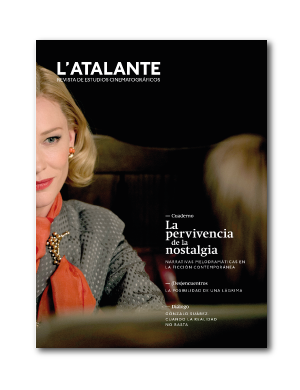Publicades 2018-01-31
Paraules clau
- Teoría fílmica,
- cine apocalíptico,
- melodrama,
- tiempo fílmico,
- herida
Com citar
Resum
El texto parte de la base de explicitar cuales son los aspectos que podemos calificar como melodramáticos para poder enfrentar el llamado cine apocalíptico desde una perspectiva que no es la coincidencia plena con los discursos al uso, sembrando, así, una duda sobre la vigencia de las etiquetas mismas. Sea como fuere, los dos elementos básicos en cualquier melodrama son el concepto de herida y el de tiempo; evidentemente, en un tipo de discurso audiovisual edificado sobre tramas que conectan de una forma más o menos evidente con algo que nos parecería el fin de los tiempos, sea por amenazas, catástrofes u otras causas que no acertamos a adivinar, las aspectos melodramáticos básicos (el tiempo y la herida) sufren alteraciones que, sin impedir que cumplan su función argumental, se proyectan en otra dimensión. La transversalidad de lo melodramático no solamente se ha mantenido en el tiempo sino que se ha reforzado.
Algo similar acontece con la herida, en tanto pérdida arrastrada de forma traumática por el personaje, que pasa en este caso a una dimensión mucho más relevante: no solo se trata de la muerte de seres queridos sino de la desaparición del género humano en su totalidad; además de la herida personal, que juega de forma similar al melodrama clásico, se arrastra una herida colectiva vinculada a un futuro inequívoco (en este caso, la herida no proviene del pasado sino que es una constatación del futuro). Partiendo se esta base, se desarrolla la argumentación recorriendo una serie de títulos emblemáticos de este tipo de cine con especial atención, como paradigma, a la serie The Leftovers.
Descàrregues
Referències
Gómez-Tarín, F. J. y Marzal Felici, J. (coords.) (2015). <em>Diccionario de conceptos y términos audiovisuales.</em> Madrid: Cátedra.<br>
González Requena, J. (1986).<em> La metáfora del espejo. El cine de Douglas Sirk</em>. Valencia/ Minneapolis: Instituto de Cine y Radio- Televisión/ Institute for the Study of Ideologies & Literature Hiperión. <br>
Marzal Felici, J. (1998). <em>David Wark Griffith</em>. Madrid: Cátedra.<br>
Deleuze, G. (1977). “Zola et la fêlure”, préface à Émile Zola. En G. Deleuze, <em>La Bête humaine</em>. Paris: Gallimard.<br>
Gómez Tarín, F. J. (2008). <em>Wong Kar-wai. Grietas en el espacio-tiempo.</em> Madrid: Akal.<br>
Català Domènech, J. M. (2009). <em>Pasión y conocimiento. El nuevo realismo melodramático</em>. Madrid: Cátedra.<br>
Leutrat, J.-L. (1999). <em>Vida de fantasmas. Lo fantástico en el cine.</em> Valencia: Ediciones de la Mirada.</p>

